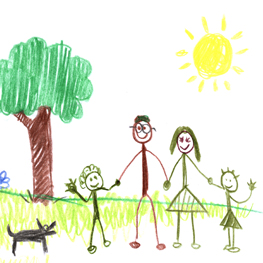
Creating more peace at home is hard work. Even my most valiant attempts at discipline - teaching my children to obey the rules and exhibit self-control - reveal I am sorely lacking it myself. These discipline strategies offer straight talk to help us become more effective at discipline.
1. Resolve not to yell. While shouting, we’re not in control. A study in The Journal of Marriage and Family (2003) revealed 88 per cent admit to screaming at their kids. I wonder if the remaining 12 per cent were just saving face.
Not in the same room? Move physically closer. State your demands with a firm, business-type tone. Myrna Shure of Raising a Thinking Child says yelling makes children immune to yelling (which is why their room remains trashed after shouting seven times to clean it). In lieu of yelling, take a problem-solving approach. If the conflict is picking up toys, ask how they think their disobedient behavior makes you feel and what they can do to change that.
2. Stop sizing ‘em up. It can be hurtful if you constantly label your child, i.e. “You’re the laziest kid I’ve ever seen!”It is unfair and cruel to compare your child to siblings, friends or cousins. It’s also unwise to praise that way, i.e. “You’re the smartest!”Kids who hear these messages over and over can become depressed or confused when they eventually confront failure.
If you have to vent, do it far away from their ears and don’t dwell on the negative. Frequently what seems like a deficit or weakness is a developmental lag that time and maturity will heal.
3. Fine-tune the manipulation radar. It may feel natural to befriend our children, but friends don’t tell their friends to brush their teeth, wear a jacket, work on a book report and get off the phone. That is parent territory and what they truly need. (Similarly, your kids typically will not tell their friends “I hate you”or, “You are the worst human on the planet.”)
Recognize when your own need for acceptance and approval is getting in the way of disciplining your kids. Children need plenty of boundaries and rules. Overcompensating, giving in and compromising boundaries won’t help them make good choices.
4. Keep expectations in check. If your toddler refuses to share their toys with a visiting playmate who has no trouble sharing, you may feel frustrated. But kids are under construction. Be mindful of whether you are simply expecting too much of your developing child.
Understand your child’s unique disposition. Recognize the cues that they are not ready for a developmental achievement such as sharing toys or sleeping away from home. If you constantly go head-to-head with your child on the same issue, it is likely they are not yet equipped to move forward.
5. Ditch wild threats. Here’s the scene: At the beach with your six-year-old, he holds a handful of sand and sports a sly grin as you threaten for the 25th time, “We will all have to leave immediately if you throw sand one more time.”If you frequently make idle threats, your kids have already learned you’re a fraud and won’t alter their behavior. Essentially, you are teaching a dangerous disconnect: it’s okay to say one thing and do another.
Be ardent about how you want your kids to behave before they step foot on the beach, a friend’s house or the department store. If you have to dole out punishment, make sure the consequence is reasonable and will be carried out. Don’t threaten, “I’m going to leave you alone on this beach if you don’t straighten up.”
6. Don’t bribe. Whenever you say, “If you…I will give you…,”you enter a danger zone. You are buying their compliance, which may not be for sale in any given circumstance. Give rewards and praise for good behavior, but don’t promise to give stickers, candy or cash as this is a disciplinary pattern, which will ultimately backfire.
7. Curb excessive talking. Instead of a monologue like, “Dental hygiene is so, so very important, honey. When we take care of our little teeth, the toothbugs can’t attack ‘em and we won’t have to go to Mr. Dentist who scares you and has the drillmajig that’s so very, very loud.”Just say, “Brush ‘em good.”Otherwise, kids can negotiate themselves out of good behavior. Excessive talk slows everyone down and also annoys everyone around you.
8. Improve lazy listening.If your kids aren’t listening, it may be in part due to your inability to hear them. If you do all the talking and shut down when they talk, you are modeling poor listening skills. Your kids could adopt these poor skills and fail socially.
Neuroscientist Mark Brady authored A Little Book of Listening Skills and says, “Learning to stop talking so much and to listen is a powerful step in loving ourselves and other people. In a world full of talkers, a skillful listener shines like the Hope Diamond.”
Listening is a simple but powerful way to show love. It is a skill at which we can all improve, and it starts with the simple idea of shutting up. Pastoral counseling professor David Augsberger indicates, “Being listened to is so close to being loved that most people don’t know the difference.”
We can all benefit in our relationships by keeping that wise thought in the forefront of our minds as we strive to more effectively discipline our kids.
Michele Ranard, M.Ed., is a professional counselor, academic tutor and freelance writer with a blog at www.hellolovelystudio.com
Calgary’s Child Magazine © 2024 Calgary’s Child